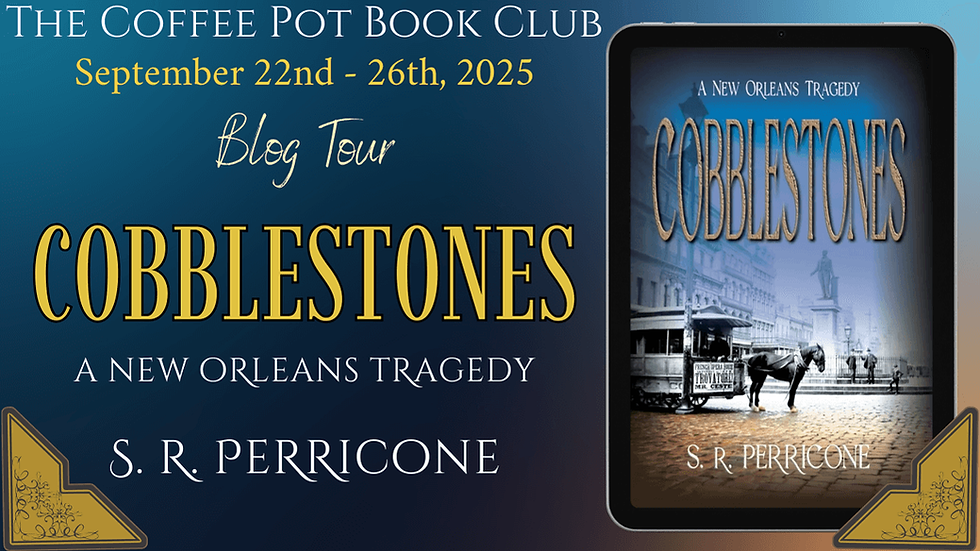Excerpt: Cobblestones – A New Orleans Tragedy by S. R. Perricone
- Archaeolibrarian

- Sep 22
- 4 min read

Book details:
Book Title: Cobblestones
Series: n/a
Author Name: S.R. Perricone
Publication Date: July 30, 2025
Publisher: Historium Press
No. of Pages: 586
Genre: Historical Fiction
Any triggers: No triggers.


@cathie.dunn1 @thecoffeepotbookclub

@thecoffeepotbookclub



The turbulent history of Post-Reconstruction New Orleans collides with the plight of Sicilian immigrants seeking refuge in America.
Antonio, a young man fleeing Sicily after avenging his father's murder, embarks on a harrowing journey to New Orleans with the help of Jesuit priests expelled from his homeland. But the promise of a fresh start quickly sours as Antonio finds himself entangled in a volatile clash of cultures, corruption, and crime.
In the late 19th century, Italian immigrants in New Orleans faced hostility, exploitation, and a brutal system of indentured servitude. Antonio becomes a witness to history as a bitter feud over the docks spirals into violence, culminating in the assassination of Irish police chief David C. Hennessy. The ensuing trial of nine Italians and the shocking lynching of eleven innocent men ignited international outrage, threatening to sever ties between the United States and Italy.
Caught in the crossfire of prejudice and power struggles, Antonio fights to survive while grappling with his own past and future. His journey weaves a gripping tale of resilience, betrayal, and the enduring hope for justice. Cobblestones: A New Orleans Tragedy is a poignant reminder of the human cost of intolerance and the courage it takes to rebuild a life from ashes.

Bookshop.org | StoryGraph | Goodreads | Smashbomb | BookBub

When Charles Dickens created his character, Samuel Pickwick, in The Pickwick Papers in 1837, he could have not imagined that twenty years later a group of soi desant elite white male Protestants in New Orleans would have appropriated his character’s name, and fictional club as inspiration for the formation of a secret society, which fostered white supremacy. Dickens was an ardent abolitionist. The club’s first president, Adley Hogan Gladden, wanted a means to celebrate he fledgling observance on the city’s Mardi Gras, while preserving New Orleans’ own variety of eugenics. Only the finest families from selected professions were selected to join. Most of the membership were attorneys, doctors, non-Jewish merchants, businessmen, and owners of the local newspapers. Most claim to be of an Anglo-Saxon pedigree, and refused to tolerate anyone whom they view as having an inferior social standing in a city carved from a cypress swamp by French Catholics, Indians, and African slaves. Every member, during the Civil War, swore allegiance to the Confederacy, and were inveterate Democrats. Indeed, Gladden, who joined the Confederate army, was killed on April 12, 1862, during the battle of Shilo, Tennessee. But the Pickwick Club endured. It endured the Union occupation of New Orleans, and the post-war Reconstruction.
The Pickwick Club had a companion club, which had many of the same social aspirations—the Boston Club. It took its name from a popular card game of the time, but some viewed its membership a social notch below the Pickwick Club, though both clubs shared and welcomed each other’s members. And both enforced and enjoyed the caste system, which controlled New Orleans. Despite some political differences, however, the clubs sometimes found their members supporting different candidates for mayor and other elected and appointed offices, which, sometimes, caused contused feelings. The Pickwickians self-identified as Bourbonist and more sophisticated than their Bostonians counterparts, who self-identified as The Ring or the Regular Democratic Organization. Every election found candidates in heated campaigns between the Bourbonist and The Ring, and often the mayor’s office and city council would switch sides every election. Since the end of Reconstruction, no republican dared to run for public office in New Orleans. In fact, the last Republican mayor of New Orleans, Benjamin Flanders was voted out of office in November 1872. The insular city despised republicans, and avoided them like yellow fever. Though it had been twenty-three years since the end of the Civil War, many nativists recalled vividly the Union yoke of Reconstruction. Long memories have long knives.



Sal Perricone, a graduate of Loyola University of New Orleans with a BA (1975) and JD (1979), has dedicated his career to law enforcement, legal practice, and public service. Beginning as a sergeant with the Jefferson Parish Sheriff’s Department, he progressed to detective with the New Orleans Police Department before practicing law privately in New Orleans. In 1985, he joined the Federal Bureau of Investigation as a Supervisory Special Agent, specializing in financial crime investigations and organized crime.
In 1991, Sal Perricone transitioned to the U.S. Attorney’s Office for the Eastern District of Louisiana, where he served as Chief of the Organized Crime Strike Force and Senior Litigation Counsel until retiring in 2012. Over his illustrious career, he prosecuted significant cases involving La Cosa Nostra, public corruption, and white-collar crime. He earned numerous accolades, including multiple Director’s Awards and the Attorney General’s Award for his role in establishing the Katrina Fraud Task Force.
An adjunct professor at Tulane University and the University of New Orleans, Sal Perricone has trained law enforcement professionals across the nation. Post-retirement, he has authored two novels with positive Catholic themes, Blue Steel Crucifix and The Shadows of Nazareth. A Brother Martin alumnus, he continues to inspire with his dedication to justice and ethics.
Author Links:
Facebook Profile: https://www.facebook.com/sal.r.perricone/
Facebook Author Page: https://www.facebook.com/srperricone
Amazon Author Page: https://www.amazon.com/stores/S.-R.-Perricone/author/B00RKH1OP6
Tour hosted by: The Coffee Pot Book Club













Thank you so much for hosting S. R. Perricone today, with an excerpt from his compelling novel, Cobblestones. Take care, Cathie xx The Coffee Pot Book Club